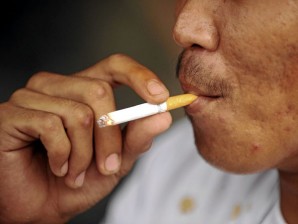Not just a sin tax, it’s also an anticancer tax—DOH
Senators should look beyond the revenue to be generated by a proposal to increase tobacco and alcohol taxes and instead see it as a life-saving measure and a health bill, the Department of Health (DOH) said Monday.
“This is not just a sin tax. This is an anticancer tax,” said Health Undersecretary Ted Herbosa.
“What we are asking our good senators is to put the health of our people as the primary concern in approving this tax measure. It is just right and responsible to tax the tobacco industry considering the billions of pesos that our healthcare is forced to carry because of the disease burden from smoking,” Herbosa said.
Approving the sin tax bill will lead to an increase in the prices of tobacco, which will discourage the youth from smoking and reduce cigarette consumption among established smokers, he said.
DOH data show that a 10-percent increase in tobacco taxes would reduce by 2 million the number of smokers by 2016. Raising the sin tax is also expected to reduce by 20 percent the number of yearly deaths due to smoking-related diseases.
Article continues after this advertisementThe World Health Organization (WHO) estimates that one in every four types of cancer is related to tobacco smoking. It is responsible for 71 percent of lung cancer deaths in the world.
Article continues after this advertisementLung cancer is the leading form of cancer in the Philippines and this is attributed to high smoking rates, particularly among men.
Cigarette products contain 7,000 chemicals with every cigarette stick having 70 cancer-causing ingredients, according to Herbosa.
The DOH said it expected more Filipinos to be stricken with cancer in the next few years.
A 2008 study showed that 11 percent of all deaths in the country were attributed to cancer. Other causes of deaths were heart attack, stroke and chronic obstructive pulmonary disease, which is also due to tobacco consumption.
“About half of all men in the Philippines are currently smoking. It will not be surprising to see an epidemic of lung cancer among our productive members in the workforce within the next 10 to 15 years,” Herbosa said.
“This will leave many children orphaned early and will have a negative effect on our economic development. This will also cost the Philippines billions of pesos for health care, chemotherapy and palliative care. A major lung cancer epidemic could deplete our resources for universal health care. So we need to focus on prevention,” he added.
Herbosa noted that smoking also increased the risks of cancer of the larynx, esophagus, stomach, pancreas, the colon and anus.
The Philippines now stands as having the biggest number of smokers in Southeast Asia at 17.3 million.
An average Filipino smoker puffs 1,073 cigarette sticks every year, while the rest of smokers in the region consume less than a thousand sticks, the WHO said.
